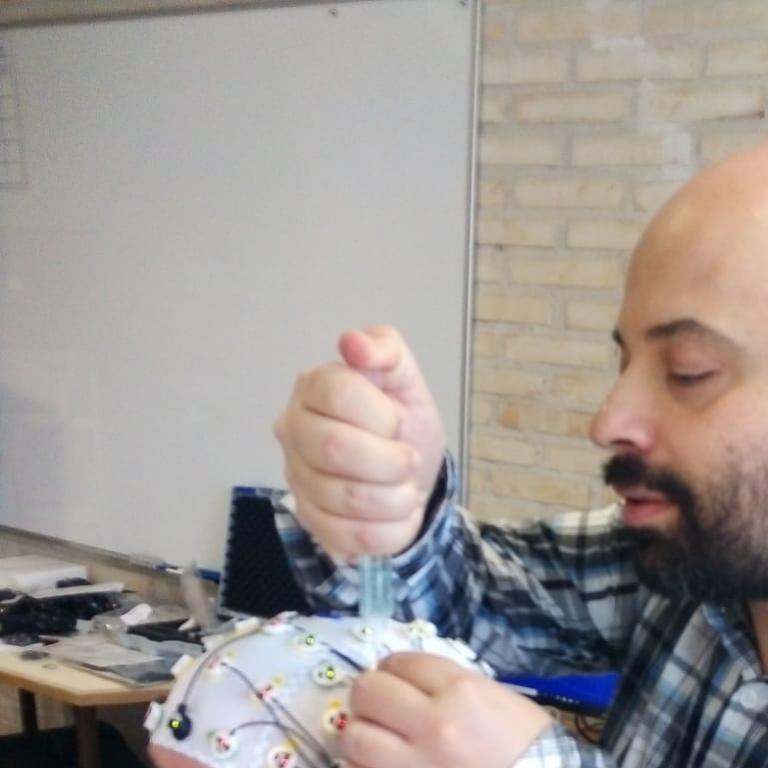Contact details
 Office B36 · Facultade de Filoloxía e Tradución · Campus Universitario · E-36310 Vigo (Spain)
Office B36 · Facultade de Filoloxía e Tradución · Campus Universitario · E-36310 Vigo (Spain)
 Campus Remoto UVigo: virtual room 2973
Campus Remoto UVigo: virtual room 2973
Member info
Yolanda Fernández-Pena holds a BA (BA Extraordinary Graduate Prize in 2013) and an MA in English Philology from the University of Vigo, where she also completed her PhD in English Linguistics in 2018 (International Award, PhD Extraordinary Award in 2020).
Yolanda joined the LVTC research group in December 2012 on an MA research grant, and the Department of English, French and German at the University of Vigo in December 2013 on a predoctoral grant from the Regional Government of Galicia (PRE/2013/396). From September 2014 to December 2017, she held an FPU grant from the Spanish Ministry of Education, Culture and Sport (FPU13/01509), which also provided generous financial support to carry out research stays at the Universities of Zurich (2015), Lancaster (2016) and Leuven (2017). Yolanda was also a predoctoral visiting scholar at the Universities of Liverpool (2014) and Leuven (2016), and a postdoctoral visiting researcher at the Universities of Leuven (2019), Graz (2019-2021) and Neuchâtel (2021-2022). She worked as Junior Lecturer ("Ayudante") at the University of Cantabria (April 2018-October 2019), as a postdoctoral fellow (Regional Government of Galicia, ED481B-2019/077) at the University of Vigo (October 2019-February 2022) and as Lecturer ("Ayudante Doctora") at the Universities of Santiago de Compostela (February-October 2022) and Vigo (October 2022-September 2023). Since January 2024, she is Senior Lecturer ("Profesora Titular de Universidad") at the Department of English, French and German at the University of Vigo.
Yolanda's research focuses on language change in the recent history of the English language, particularly on the linguistic variation of verb number agreement with complex collective subjects in Late Modern and Present-Day English and the syntactic characterisation and corpus-driven categorisation of fragments in Present-Day English, as well as on the provision of agreement morphology and overt subjects in L2 English in (non-)CLIL contexts in Spain.
Dissertations
- (2018) PhD Thesis (International Doctorate, PhD Extraordinary Award in 2020): Determinants of verb number agreement with complex collective subjects: A corpus-based analysis in English. Supervisor: Prof. Javier Pérez-Guerra. PhD examiners: Prof. Kristin Davidse (KU Leuven), Prof. Juan Carlos Acuña Fariña (University of Santiago de Compostela) and Prof. Magnus Levin (Linnaeus University).
- (2015) BA Thesis ("tesina"): A corpus-based study on verbal agreement with collective nouns in the recent history of English. Supervisor: Prof. Javier Pérez-Guerra.
- (2013) MA Thesis: Verbal agreement and animacy in British English collective noun-based constructions: A case study with of-dependents. Supervisor: Prof. Javier Pérez-Guerra.
Publications 


2025
- Fernández-Pena, Yolanda & Javier Pérez-Guerra. An ecology of fragmentary constructions in English: A corpus-driven cognitive categorisation. In Torsten Leuschner, Anaïs Vajnovszki, Gauthier Delaby & Jóhanna Barðdal (eds.), How to do things with corpora: Methodological issues and case studies on grammar, 91-126. Berlin: J.B. Metzler.
2024
-
Fernández-Pena, Yolanda & Javier Pérez-Guerra. A constructionalist account of why-fragments and Mad Magazine sentences: The ‘Sceptical Small’ construction. English Language and Linguistics 28(3). 491-520.
-
Fernández-Pena, Yolanda, Gunther Kaltenböck & Javier Pérez-Guerra. Fragments: A usage-based view. Special issue "Fragments: Construction and reconstruction", English Language and Linguistics 28(3). 447-464.
- Fernández-Pena, Yolanda & Javier Pérez-Guerra. Why why-fragments? A corpus-based constructionist analysis of their form and meaning. In Stefania Maci & Giovanni Garofalo (eds.), Investigating discourse and texts: Corpus-assisted analytical perspectives, 131-160. Lausanne: Peter Lang. ISBN: 978-3-0343-4753-2. doi: 10.3726/b19739
-
Gallardo-del-Puerto, Francisco & Yolanda Fernández-Pena. On the effect of CLIL intensity on the agreement morphology errors and null subjects of young learners of English. In Ana Montoya-Reyes, Anabella Barsaglini-Castro & Estefanía Sánchez-Barreiro (eds.), A multidisciplinary approach to applied linguistics and education: Building knowledge in foreign language teaching, translation, critical discourse analysis and posthumanism, 15-38. Berlin: Peter Lang. ISBN: 978-3-631-90345-5. doi: 10.3726/b21446
2023
- Fernández-Pena, Yolanda & Javier Pérez-Guerra. A corpus-based analysis of the enriched interpretation of why-fragments in contemporary British English. In Luis Javier Conejero Magro, Cristina Blanco García, Laura Méndez Márquez & Jennifer Ruiz-Morgan (eds.), Bridging cultures: English and American studies in Spain, 103-111. Cáceres: Servicio de Publicaciones de la Universidad de Extremadura. ISBN: 978-84-9127-212-0.
2022
- Fernández-Pena, Yolanda. An analysis of fragments in Present-Day written and spoken English. In Francisco Gallardo-del-Puerto, Mª del Carmen Camus Camus & Jesús Ángel González-López (eds.), Moving beyond the pandemic: English and American studies in Spain, 56-64. Santander: Editorial de la Universidad de Cantabria. ISBN: 978-84-19024-15-2. doi: 10.22429/Euc2022.034
- Fernández-Pena, Yolanda. Modelling verb number agreement variation with complex collective subjects in inner-circle varieties of English. In Manfred Krug, Valentin Werner, Ole Schützler & Fabian Vetter (eds.), Perspectives on contemporary English: Structure, variation, cognition, 125-153. Bern: Peter Lang. ISBN: 9783631878149. doi: 10.3726/b19739
2021
- Fernández-Pena, Yolanda. Towards an empirical characterisation and a corpus-driven taxonomy of fragments in written contemporary English. RÆL, Revistælectrónica de Lingüística Aplicada, 20(1). 136-154.
- Fernández-Pena, Yolanda & Francisco Gallardo-del-Puerto. Agreement morphology errors and null subjects in young (non-)CLIL learners. VIAL, Vigo International Journal of Applied Linguistics 18(1). 59-96. doi: 10.35869/vial.v0i18.3365
2020
- Fernández-Pena, Yolanda. Reconciling synchrony, diachrony and usage in verb number agreement with complex collective subjects. New York: Routledge. ISBN: 978-0-367-41715-4. doi: 10.4324/9780367815899. Reviews: Nexus 2021.01, English Language and Linguistics 26(4) and Research in Corpus Linguistics (RiCL) 10(2). Awards: AEDEAN Leocadio Martín Mingorance Book Award on Theoretical and Applied English Linguistics 2021, AESLA Guadalupe Aguado Research Award for Young Researchers 2022 and 2022 ESSE Book Award for Young Researchers in the category English Language and Linguistics.
- Fernández-Pena, Yolanda. Review of Laure Gardelle's Semantic plurality: English collective nouns and other ways of denoting pluralities of entities. John Benjamins, 2019. Babel - AFIAL: Aspectos de Filología Inglesa y Alemana 29(1). 153-160. doi: 10.35869/afial.v0i29.3282.
- Fernández-Pena, Yolanda. Complex collective subjects in inner-circle World Englishes: Verb number variation and quantifying usage. In Pilar Guerrero Medina, Macarena Palma Gutiérrez & María Valero Redondo (eds.), Advances in English and American studies: Current developments, future trends, 117-129. Córdoba: UCOPress, Cordoba University Press. ISBN: 978-84-9927-546-8.
2018
- Fernández-Pena, Yolanda. The expression of quantification in binominal subjects integrating collective nouns. In Mª Beatriz Hernández, Manuel Brito & Tomás Monterrey (eds.), Broadening horizons: A peak panorama of English studies in Spain, 237-246. La Laguna: Servicio de Publicaciones, Universidad de La Laguna. ISBN: 978-84-15939-66-5.
- Fernández-Pena, Yolanda. New insights into the idiomatisation of NCOLL-of-NPL constructions. In María Ferrández San Miguel & Claus-Peter Neuman (eds.), Taking stock to look ahead: Celebrating forty years of English studies in Spain, 197-206. Zaragoza: Prensas Universitarias de la Universidad de Zaragoza. ISBN: 978-84-16723-51-5. doi: 10.26754/uz.978-84-16723-51-5.
2017
- Fernández-Pena, Yolanda. Sujetos colectivos y concordancia verbal: Un estudio de frecuencias, semántica y sintaxis (Collective subjects and verbal agreement: A study of frequency, semantics and syntax). RÆL, Revistælectrónica de Lingüística Aplicada 16(1). 70-84.
- Fernández-Pena, Yolanda. Patterns of verbal agreement with collective nouns taking plural of-dependents: A corpus-based analysis of syntactic distance. Corpora 12(2). 207-241. doi: 10.3366/cor.2017.0117.
- Fernández-Pena, Yolanda. Verbal agreement with collectives taking of-dependents: Syntactic and structural complexity as determinant factors. In Sofía Bemposta-Rivas, Carla Bouzada-Jabois, Yolanda Fernández-Pena, Tamara Bouso, Yolanda J. Calvo-Benzies & Iván Tamaredo (eds.), New trends and methodologies in applied English language research III: Synchronic and diachronic studies on discourse, lexis and grammar processing, 109-130. Bern & New York: Peter Lang. ISBN: 978-3-0343-2039-9, doi: 10.3726/978-3-0351-0932-0.
- Bemposta-Rivas, Sofía, Carla Bouzada-Jabois & Yolanda Fernández-Pena. Introduction. In Sofía Bemposta-Rivas, Carla Bouzada-Jabois, Yolanda Fernández-Pena, Tamara Bouso, Yolanda J. Calvo-Benzies & Iván Tamaredo (eds.), New trends and methodologies in applied English language research III: Synchronic and diachronic studies on discourse, lexis and grammar processing, 7-16. Bern & New York: Peter Lang. ISBN: 978-3-0343-2039-9, doi: 10.3726/978-3-0351-0932-0.
- Bemposta-Rivas, Sofía, Carla Bouzada-Jabois, Yolanda Fernández-Pena, Tamara Bouso, Yolanda J. Calvo-Benzies & Iván Tamaredo (eds.) New trends and methodologies in applied English language research III: Synchronic and diachronic studies on discourse, lexis and grammar processing. Bern & New York: Peter Lang. 280 pages. ISBN: 978-3-0343-2039-9, doi: 10.3726/978-3-0351-0932-0.
- Fernández-Pena, Yolanda. Verbal agreement with collective nominal constructions: Syntactic and semantic determinants. Atlantis 39(1). 33-54.
- Fernández-Pena, Yolanda. 'These points stated, a number of problems remain': A corpus-based analysis of the idiomatisation of collective noun-based constructions. In Sebastian Hoffmann, Andrea Sand & Sabine Arndt-Lappe (eds.), Exploring recent diachrony: Corpus studies of lexicogrammar and language practices in Late Modern English (Studies in Variation, Contacts and Change in English 18). Helsinki: VARIENG.
- Fernández-Pena, Yolanda. Exploring the patterns of verbal agreement of collective noun-headed subjects in a parsed corpus of Present-Day English. In Chelo Vargas-Sierra (ed.), AESLA 2016 – Professional and academic discourse: An interdisciplinary perspective, 325-334. Manchester: Easychair. doi: 10.29007/8v9n.
2016
- Fernández-Pena, Yolanda. Tracing the history of of-collectives: On the idiomatisation of a number of, a/the majority of and a group of. In Aitor Ibarrola-Armendariz & Jon Ortiz de Urbina Arruabarrena (eds.), On the move: Glancing backwards to build a future in English studies, 247-256. Bilbao: University of Deusto. ISBN: 978-84-15759-87-4.
- Fernández-Pena, Yolanda. Revisiting the role of plural of-dependents on verbal agreement with collective nouns: A syntactic pilot study on New Englishes. In Aitor Ibarrola-Armendariz & Jon Ortiz de Urbina Arruabarrena (eds.), On the move: Glancing backwards to build a future in English studies, 237-245. Bilbao: University of Deusto. ISBN: 978-84-15759-87-4.
2015
- Fernández-Pena, Yolanda. Verbal agreement with collective noun-based constructions: Syntactic and lexical implications of of-dependents. In Alberto Lázaro Lafuente & María Dolores Porto Requejo (eds.), English and American studies in Spain: New developments and trends, 206-217. Alcalá de Henares: University of Alcalá de Henares. ISBN: 978-84-16599-11-0.
2014
- Fernández-Pena, Yolanda. Collective nouns in English: A corpus-based study on agreement. In Esther Álvarez López, Emilia María Durán Almarza & Alicia Menéndez Tarrazo (eds.), Building interdisciplinary knowledge. Approaches to English and American studies in Spain, 323-334. Oviedo: KRK Ediciones. ISBN: 978-84-8367-475-8.
Conference organisation
I have been involved in the organisation of the following conferences and seminars:
- (08-09 July 2024) 2nd Gibraltar International Conference (GIC2)
- (26-28 June 2024) 6th Variation and Language Processing Conference (VALP6)
- (18-22 June 2024) 45th ICAME Conference (ICAME45)
- (11 July 2023) Research seminar 'Fragments'
- (15-17 June 2023) 32nd European Systemic Functional Linguistics Conference (ESFLC2023)
- (19-20 January 2023) International workshop: Modelling the linguistic architecture of English: Cognitive and empirical developments (Modelling2023)
- (06-07 October 2022) International workshop: Advancing code-switching research
- (16 September 2022) Seminar: Fragments: Construction and reconstruction (at the 9th Biennial International Conference of the Linguistics of Contemporary English, University of Ljubljana) [together with Gunther Kaltenböck & Javier Pérez-Guerra]
- (23-25 September 2021) 6th Prescriptivism Conference. Modelling Prescriptivism: Language, Literature, and Speech Communities
- (24-25 May 2018) Modelling the Linguistic Architecture of English: Theories and Methods
- (28-30 September 2017) 7th Biennial International Conference on the Linguistics of Contemporary English (BICLCE2017)
- (15-17 September 2016) 28th International Conference of the Spanish Society for Medieval English Language and Literature (SELIM 28)
- (04-06 February 2015) Exploring Liminality in Anglophone Studies (4th ASYRAS Conference)
- (04-06 February 2015) Fourth International Postgraduate Conference on Language and Cognition (ELC4)
- (18-19 October 2013) Englishes Today International Conference: Theoretical and methodological issues
- (09-10 November 2012) International Workshop: Ellipsis2012
Teaching
-
Language for Specific Purposes (Degree in Foreign Languages)
-
Variation and Changes in the First Foreign Language: English (Degree in Foreign Languages)
-
Language 2, III: English (Degree in Translation and Interpreting: Spanish-French)
-
Language 2, IV: English (Degree in Translation and Interpreting: Spanish-French)
-
English for Specific Purposes (Master's Degree in Advanced English Studies and its Applications)
-
Foreign Languages in the Spanish and International Context (Master's Degree in Teaching in Compulsory Secondary Education, Baccalaureate, Vocational Training and Language Teaching. Specialisation: Languages and Literatures. Foreign Languages)











